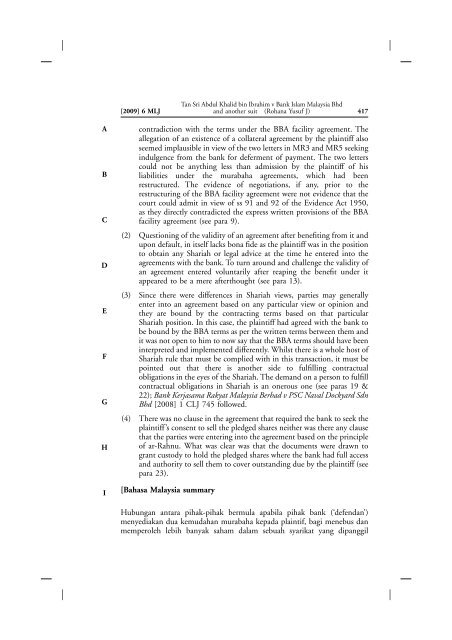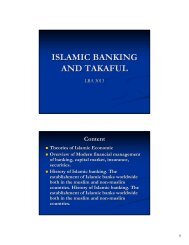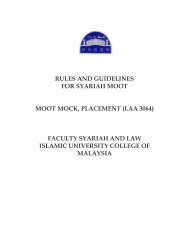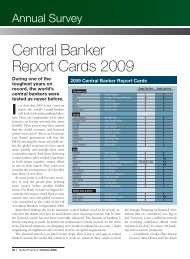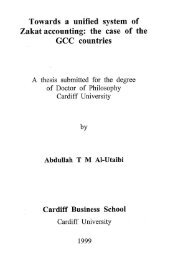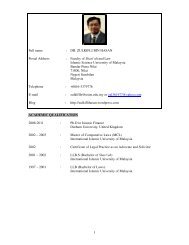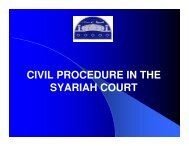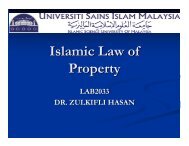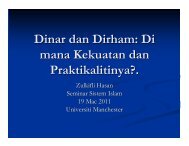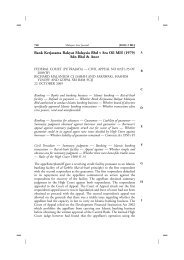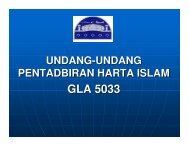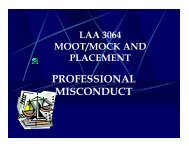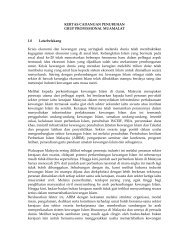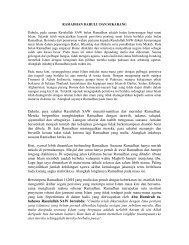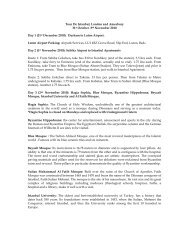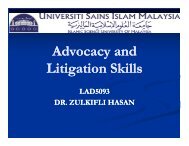Tan Sri Abdul Khalid bin Ibrahim v Bank Islam Malaysia Bhd and ...
Tan Sri Abdul Khalid bin Ibrahim v Bank Islam Malaysia Bhd and ...
Tan Sri Abdul Khalid bin Ibrahim v Bank Islam Malaysia Bhd and ...
Create successful ePaper yourself
Turn your PDF publications into a flip-book with our unique Google optimized e-Paper software.
A<br />
B<br />
C<br />
D<br />
E<br />
F<br />
G<br />
H<br />
I<br />
<strong>Tan</strong> <strong>Sri</strong> <strong>Abdul</strong> <strong>Khalid</strong> <strong>bin</strong> <strong>Ibrahim</strong> v <strong>Bank</strong> <strong>Islam</strong> <strong>Malaysia</strong> <strong>Bhd</strong><br />
[2009] 6 MLJ <strong>and</strong> another suit (Rohana Yusuf J)<br />
417<br />
contradiction with the terms under the BBA facility agreement. The<br />
allegation of an existence of a collateral agreement by the plaintiff also<br />
seemed implausible in view of the two letters in MR3 <strong>and</strong> MR5 seeking<br />
indulgence from the bank for deferment of payment. The two letters<br />
could not be anything less than admission by the plaintiff of his<br />
liabilities under the murabaha agreements, which had been<br />
restructured. The evidence of negotiations, if any, prior to the<br />
restructuring of the BBA facility agreement were not evidence that the<br />
court could admit in view of ss 91 <strong>and</strong> 92 of the Evidence Act 1950,<br />
as they directly contradicted the express written provisions of the BBA<br />
facility agreement (see para 9).<br />
(2) Questioning of the validity of an agreement after benefiting from it <strong>and</strong><br />
upon default, in itself lacks bona fide as the plaintiff was in the position<br />
to obtain any Shariah or legal advice at the time he entered into the<br />
agreements with the bank. To turn around <strong>and</strong> challenge the validity of<br />
an agreement entered voluntarily after reaping the benefit under it<br />
appeared to be a mere afterthought (see para 13).<br />
(3) Since there were differences in Shariah views, parties may generally<br />
enter into an agreement based on any particular view or opinion <strong>and</strong><br />
they are bound by the contracting terms based on that particular<br />
Shariah position. In this case, the plaintiff had agreed with the bank to<br />
be bound by the BBA terms as per the written terms between them <strong>and</strong><br />
it was not open to him to now say that the BBA terms should have been<br />
interpreted <strong>and</strong> implemented differently. Whilst there is a whole host of<br />
Shariah rule that must be complied with in this transaction, it must be<br />
pointed out that there is another side to fulfilling contractual<br />
obligations in the eyes of the Shariah. The dem<strong>and</strong> on a person to fulfill<br />
contractual obligations in Shariah is an onerous one (see paras 19 &<br />
22); <strong>Bank</strong> Kerjasama Rakyat <strong>Malaysia</strong> Berhad v PSC Naval Dockyard Sdn<br />
<strong>Bhd</strong> [2008] 1 CLJ 745 followed.<br />
(4) There was no clause in the agreement that required the bank to seek the<br />
plaintiff’s consent to sell the pledged shares neither was there any clause<br />
that the parties were entering into the agreement based on the principle<br />
of ar-Rahnu. What was clear was that the documents were drawn to<br />
grant custody to hold the pledged shares where the bank had full access<br />
<strong>and</strong> authority to sell them to cover outst<strong>and</strong>ing due by the plaintiff (see<br />
para 23).<br />
[Bahasa <strong>Malaysia</strong> summary<br />
Hubungan antara pihak-pihak bermula apabila pihak bank (‘defendan’)<br />
menyediakan dua kemudahan murabaha kepada plaintif, bagi menebus dan<br />
memperoleh lebih banyak saham dalam sebuah syarikat yang dipanggil


